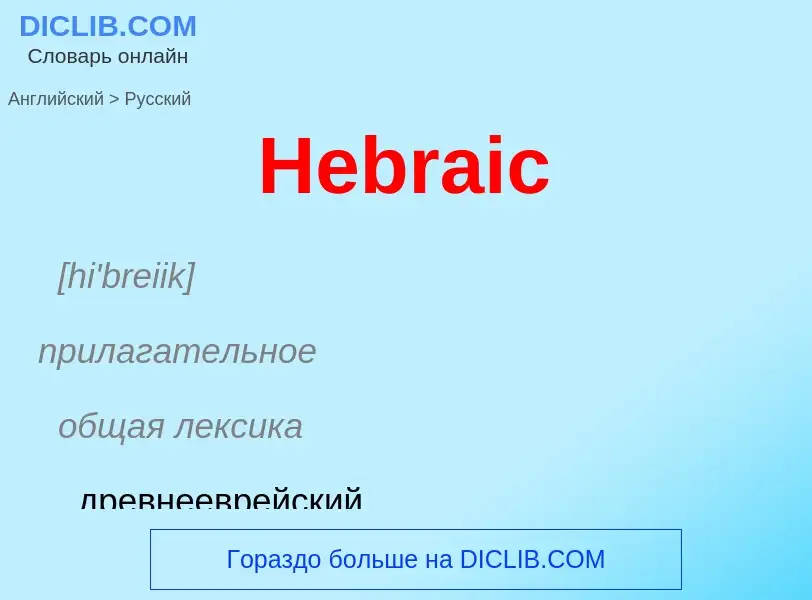Vertaling en analyse van woorden door kunstmatige intelligentie ChatGPT
Op deze pagina kunt u een gedetailleerde analyse krijgen van een woord of zin, geproduceerd met behulp van de beste kunstmatige intelligentietechnologie tot nu toe:
- hoe het woord wordt gebruikt
- gebruiksfrequentie
- het wordt vaker gebruikt in mondelinge of schriftelijke toespraken
- opties voor woordvertaling
- Gebruiksvoorbeelden (meerdere zinnen met vertaling)
- etymologie
Hebraic - vertaling naar russisch
[hi'breiik]
прилагательное
общая лексика
древнееврейский
относящийся к древнееврейскому языку или иудеям
Definitie
Wikipedia

Hebrew (Hebrew alphabet: עִבְרִית, ʿĪvrīt, pronounced [ivˈʁit] (listen) or [ʕivˈrit] (listen); Samaritan script: ࠏࠁࠓࠉࠕ; Paleo-Hebrew script: 𐤏𐤁𐤓𐤉𐤕) is a Northwest Semitic language within the Afroasiatic language family. It was natively spoken by the Israelites and remained in regular use as a spoken language by their longest-surviving descendants, the Jews and Samaritans, before dying out after 200 CE. However, it was largely preserved as a liturgical language, featuring prominently in Judaism (since the Second Temple period) and Samaritanism. Having ceased to be a dead language in the 19th century, today's Hebrew serves as the only successful large-scale example of linguistic revival. It is the only non-extinct Canaanite language, and is also one of only two Northwest Semitic languages still spoken, with the other being Aramaic.
The earliest examples of written Paleo-Hebrew date back to the 10th century BCE. Nearly all of the Hebrew Bible is written in Biblical Hebrew, with much of its present form in the dialect that scholars believe flourished around the 6th century BCE, during the time of the Babylonian captivity. For this reason, Hebrew has been referred to by Jews as Lashon Hakodesh (לְשׁוֹן הַקֹּדֶשׁ, lit. 'the holy tongue' or 'the tongue [of] holiness') since ancient times. The language was not referred to by the name Hebrew in the Bible, but as Yehudit (transl. 'the language of Judah') or Səpaṯ Kəna'an (transl. "the language of Canaan"). Mishnah Gittin 9:8 refers to the language as Ivrit, meaning Hebrew; however, Mishnah Megillah refers to the language as Ashurit, meaning Assyrian, which is derived from the name of the alphabet used, in contrast to Ivrit, meaning the Paleo-Hebrew alphabet.
Hebrew ceased to be a regular spoken language sometime between 200 and 400 CE as it declined in the aftermath of the unsuccessful Bar Kokhba revolt, which was carried out against the Roman Empire by the Jews of Judaea. Aramaic and, to a lesser extent, Greek were already in use as international languages, especially among societal elites and immigrants. Hebrew survived into the medieval period as the language of Jewish liturgy, rabbinic literature, intra-Jewish commerce and Jewish poetic literature. The first dated book printed in Hebrew was published by Abraham Garton in Reggio (Calabria, Italy) in 1475. With the rise of Zionism in the 19th century, the Hebrew language experienced a full-scale revival as a spoken and literary language, after which it became the main language of the Yishuv in Palestine and subsequently the lingua franca of the State of Israel with official status.
According to Ethnologue, Hebrew was spoken by five million people worldwide in 1998; in 2013, it was spoken by over nine million people worldwide. After Israel, the United States has the second-largest Hebrew-speaking population, with approximately 220,000 fluent speakers (see Israeli Americans and Jewish Americans). Modern Hebrew is the official language of the State of Israel, while pre-revival forms of Hebrew are used for prayer or study in Jewish and Samaritan communities around the world today; the latter group utilizes the Samaritan dialect as their liturgical tongue. As a non-first language, it is studied mostly by non-Israeli Jews and students in Israel, by archaeologists and linguists specializing in the Middle East and its civilizations, and by theologians in Christian seminaries.


![Masoretic]] pointing (Joshua 1:1). Masoretic]] pointing (Joshua 1:1).](https://commons.wikimedia.org/wiki/Special:FilePath/Aleppo Codex Joshua 1 1.jpg?width=200)
![Hebrew, [[Arabic]] and English multilingual signs on an Israeli highway Hebrew, [[Arabic]] and English multilingual signs on an Israeli highway](https://commons.wikimedia.org/wiki/Special:FilePath/Annava165.jpg?width=200)

![[[Hebrew alphabet]] [[Hebrew alphabet]]](https://commons.wikimedia.org/wiki/Special:FilePath/Frank-ruehl.png?width=200)
![crowns]]" on tops of certain letters. crowns]]" on tops of certain letters.](https://commons.wikimedia.org/wiki/Special:FilePath/Sefer-torah-vayehi-binsoa.jpg?width=200)
![Shebna Inscription]], from the tomb of a royal steward found in [[Siloam]], dates to the 7th century BCE. Shebna Inscription]], from the tomb of a royal steward found in [[Siloam]], dates to the 7th century BCE.](https://commons.wikimedia.org/wiki/Special:FilePath/Silwan-inscr.jpg?width=200)

![The word HEBREW written in modern Hebrew language (top) and in [[Paleo-Hebrew alphabet]] (bottom) The word HEBREW written in modern Hebrew language (top) and in [[Paleo-Hebrew alphabet]] (bottom)](https://commons.wikimedia.org/wiki/Special:FilePath/המילה עברית בכתב ובכתב העברי הקדום.jpg?width=200)
![cursive form]]. cursive form]].](https://commons.wikimedia.org/wiki/Special:FilePath/עברית handwritten form.jpg?width=200)
